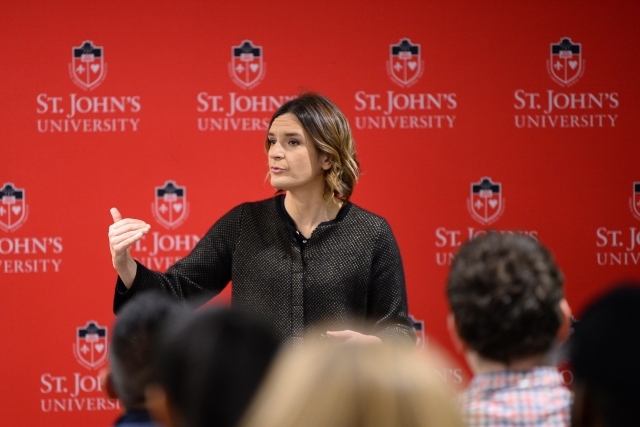
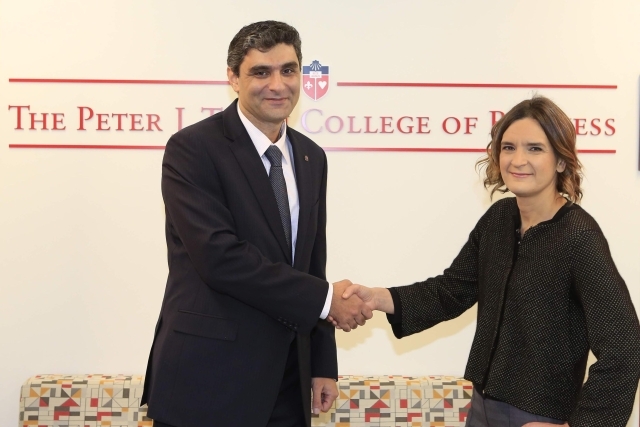
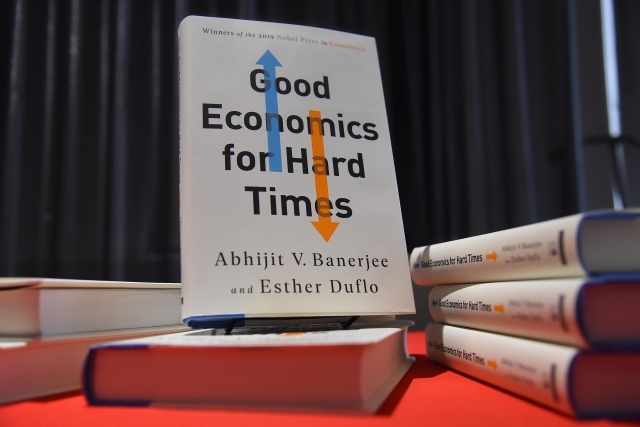
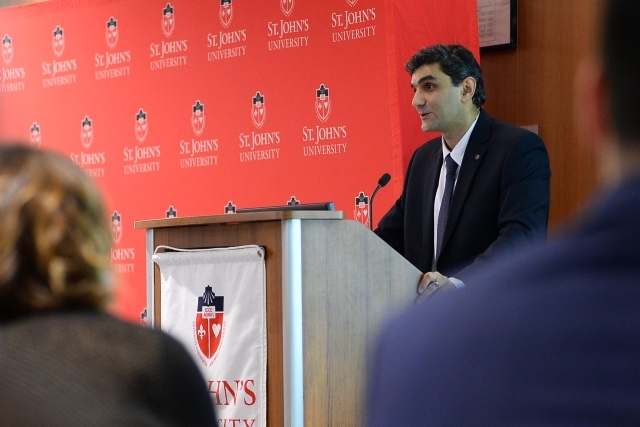
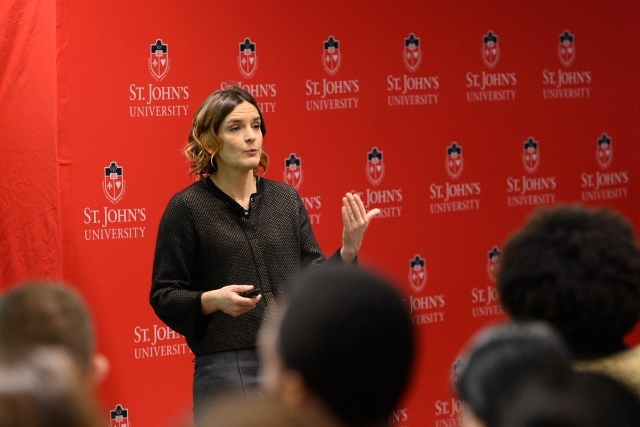
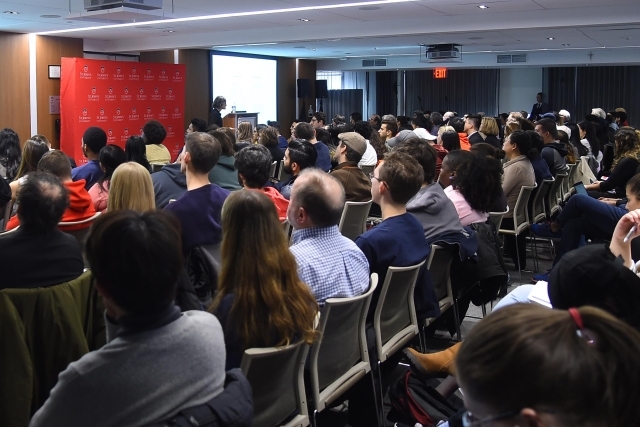
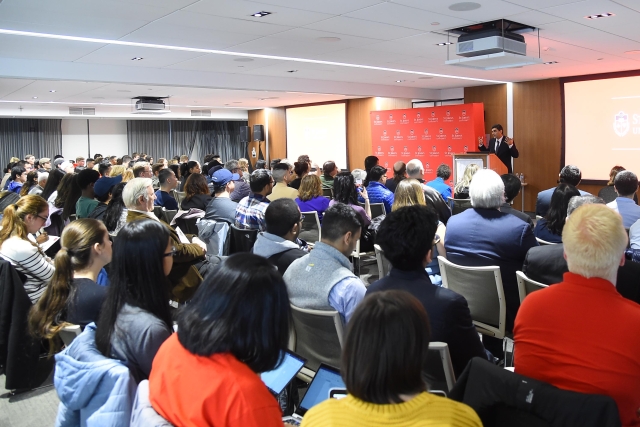
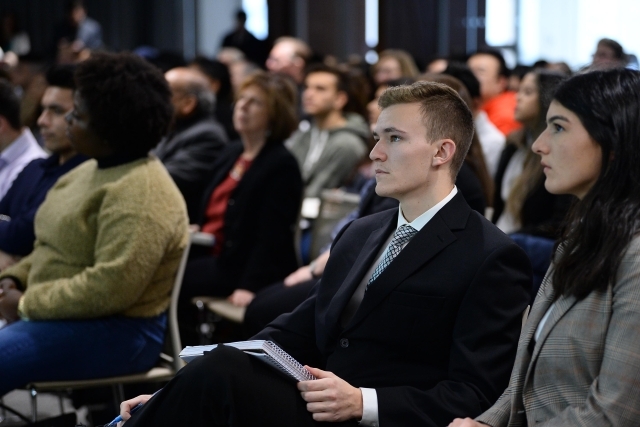








Overall mistrust of economists is high among the general public because these experts are not perceived as good forecasters. Still, economists possess the intellectual capacity and analytical means to guide economic and public policy toward the general good of society.
These observations were made by Esther Duflo, Ph.D.—the second woman, and at 46 years old, the youngest person ever to be awarded a Nobel Prize in economics—while delivering the Henry George Lecture on Monday, November 25, before an overflow audience of students, faculty, administrators, and staff who assembled in The Peter J. Tobin College of Business on the Queens, NY, campus, of St. John’s University.
Additionally, she noted, as consumers, we are all critical components of the economy. As individuals, we can adapt our consumption habits to ensure a more sustainable future.
The joint winner of the 2019 Sveriges Riksbank Prize in Economic Sciences in Memory of Alfred Nobel, Dr. Duflo was invited to campus to talk about her new book, Good Economics for Hard Times (PublicAffairs Books, November 2019), that she coauthored with her husband and colleague, Abhijit V. Banerjee, Ph.D., an economist at the Massachusetts Institute of Technology, and Michael Kremer, Ph.D., an economist at Harvard University.
Dr. Duflo is the Abdul Latif Jameel Professor of Poverty Alleviation and Development Economics in the Department of Economics at MIT. She is a cofounder and codirector of the Abdul Latif Jameel Poverty Action Lab.
Dr. Duflo shares the Nobel with Drs. Banerjee and Kremer for their experimental approach to alleviating global poverty. Their work and scholarship are credited with helping to transform antipoverty research and relief efforts.
The Henry George Lecture series is named for the pioneering political economist and reformer from the 19th century who authored the 1879 seminal work, Progress and Poverty.
During his welcoming remarks, host Aleksandr V. Gevorkyan, Ph.D., the Henry George Chair in Economics and Associate Professor of Economics in the Department of Economics and Finance at Tobin, noted Dr. Duflo was the 11th Nobel Laureate to present the Henry George Lecture.
“Her presentation was truly in the spirit of Henry George’s general tradition, as many of the problems raised by Dr. Duflo and policy solutions she discussed echoed the core concern raised by Henry George in building an inclusive, prosperous, and modern society,” said Dr. Gevorkyan after Dr. Duflo spoke.
“We are honored to have Dr. Esther Duflo deliver the Henry George Lecture,” said Norean R. Sharpe, Ph.D., Dean, Joseph H. and Maria C. Schwartz Distinguished Chair, and Professor of Decision Sciences at Tobin College. “Not only is Good Economics for Hard Times a timely topic, it is one that connects with the mission of St. John’s University.”
In their book, Drs. Duflo and Banerjee aim to demonstrate how economics research can be applied to solve some of the most difficult social issues, including unequal economic growth and climate change.
Through the economists’ research, they seek to understand the economic lives of the poor, with the goal to help design and evaluate social policies. Dr. Duflo has studied a wide range of topics pertaining to global poverty, including health, education, financial inclusion, environment, and governance, and developed new antipoverty programs based on that research.
In a recently released statement, the Royal Swedish Academy of Sciences, which grants the Nobel awards, stated the work of Drs. Duflo, Banerjee, and Kremer has “dramatically improved our ability to fight poverty in practice” and cited their “new approach to obtaining reliable answers about the best ways to fight global poverty.”
During a question and answer session that followed the lecture, Dr. Duflo addressed a query from Ashleigh S. Stampp, an economics major, regarding the underrepresentation of women in the field of economics. She attributed the dearth of female economists to a culture that favors a “locker room” atmosphere.
“I think the second reason there are not enough female economists is, while I do not think it is meant to be an antiwoman culture, it is quite aggressive, and girls have always been trained to be nice and polite,” added Dr. Duflo.
She also drew laughter from the audience when she shared that she initially had no interest in economics. “Talking about the interest rate and the financial markets held absolutely no fascination for me,” said Dr. Duflo. “I became an economist by accident.” But her passion for the profession was ignited when she realized the work of economists affects a diverse range of issues critical to humankind, from climate change to the eradication of global poverty.
With Dr. Banerjee, Dr. Duflo previously wrote, Poor Economics: A Radical Rethinking of the Way to Fight Global Poverty, which explored the real nature of poverty and how the poor handled incentives. The book won the 2011 Financial Times and Goldman Sachs Business Book of the Year Award, and is translated into more than 17 languages.
Dr. Duflo is the Editor of the American Economic Review, a member of the National Academy of Sciences, and a Corresponding Fellow of the British Academy.
Related News
Q&A with Christopher E. Fisher, Psy.D. ’14M.S.Ed., LEAD Honoree
Christopher E. Fisher, Psy.D. ’14M.S.Ed., Licensed Clinical Psychologist and Director, Behavioral Health in Zucker Hillside Hospital, will be among several alumni honored by The School of Education...
Q&A with Darius Penikas ’08M.S.Ed., ’19Ed.D., LEAD Honoree
Darius Penikas ’08M.S.Ed., ’19Ed.D., Principal of Archbishop Molloy High School, will be among several alumni honored by The School of Education (SOE) at the 15th Annual Leaders in Education Awards...
Q&A with Alicia Calabrese ’94SJC., LEAD Honoree
Alicia Calabrese ’94SJC, Principal of Floral Park Memorial High School, will be among several alumni honored by The School of Education (TSOE) at the 15th Annual Leaders in Education Awards Dinner...
